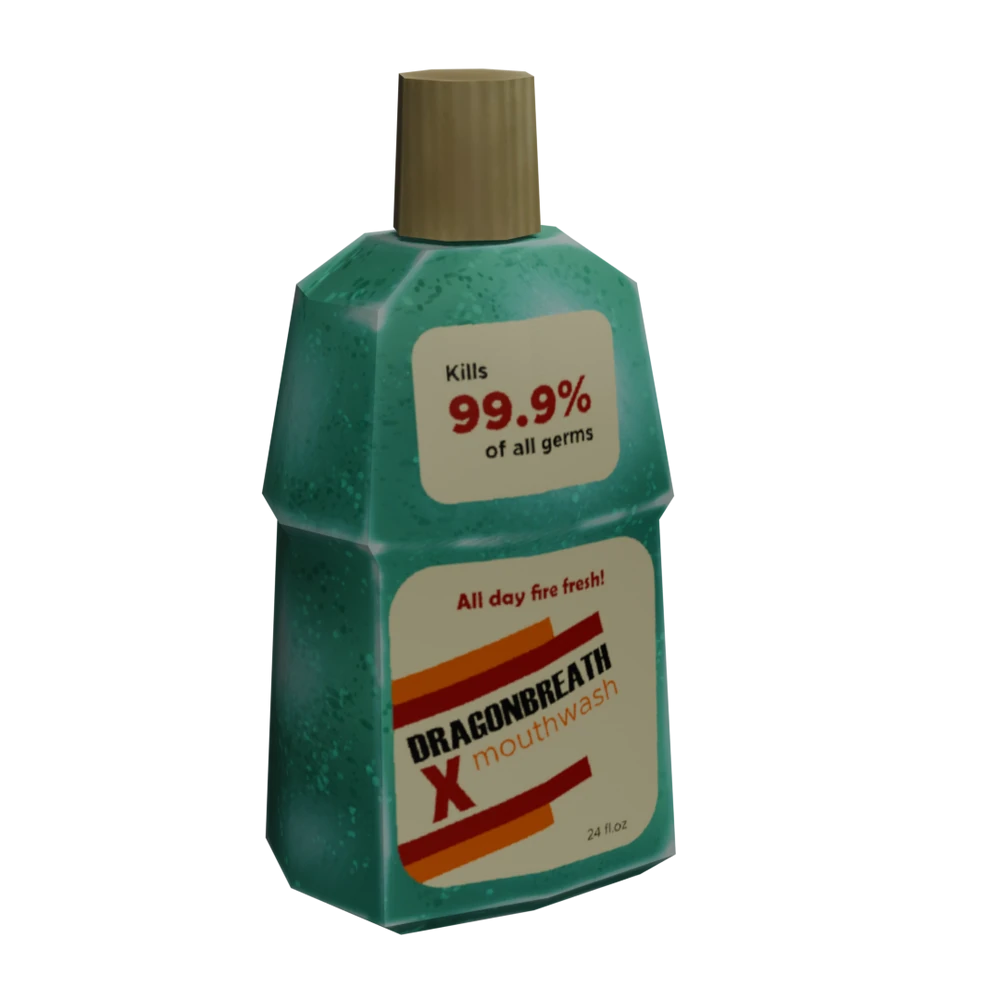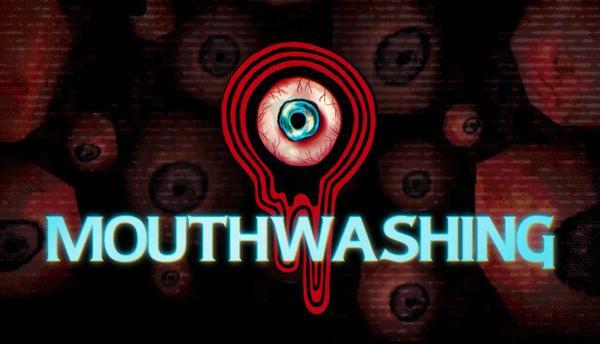
What if you blended The Shining, Eraserhead, and Alien into a stellar piece of interactive fiction?
Spoilers ahead! If you haven’t played the game, content warning for both it and this blog post: sexual violence, workplace violence, forced pregnancy, alcoholism, gore, and cannibalism.
I love Da Movies and I love video games. It’s easy to laugh at how saccharine the AMC theaters ad is but dammit, Nicole Kidman is right, there is something magical about seeing beautiful and evocative imagery on a big screen. And video games take this a step farther by handing control over the pacing to the audience. Just by adding a layer of interactivity, video games can take the visual and audio cues of movies and elevate it into something even more special. Mouthwashing is a narrative adventure game that truly exemplifies this. It goes beyond being a “playable movie” with intentional choices in its UI and puzzle design that enhance its narrative. In its 3 hour playtime it completely engrossed me. From the striking sunset vidscreen, the homages to horror games past, to little character vignettes, this game has been firmly nestled in back of my mind for two months now. It is clearly standing on the shoulders of horror movie giants while delivering interactive fiction in a way only video games can.
When I first sat down with my Steam Deck to play, I had assumed the game would be The Shining in space. After all the character I had seen the most fanart of, Anya, looked like Shelly Duval in Ellen Ripley’s clothes. And in someways it is. The crew is trapped on the cargo ship Tulpar for a shitty long-haul route, much like the Torrence family taking over winter duties in the Overlook hotel. In the Shining, it is Wendy, constantly berated by Jack, who cooks and maintains the hotel while Jack writes. Similarly, Anya endures torrents of abuse from Jimmy while managing to keep a severe burn victim alive with meager supplies. And the touching monologue the engineer Swansea gives about his struggles with sobriety reminded me of Gita Jackson’s comments about the horror of relapse the film instills. But as the refrain of “TAKE RESPONSIBILITY” flashed on screen over and over again, my mind turned to one of the big influences for Kubrick’s Shining: David Lynch’s Eraserhead.
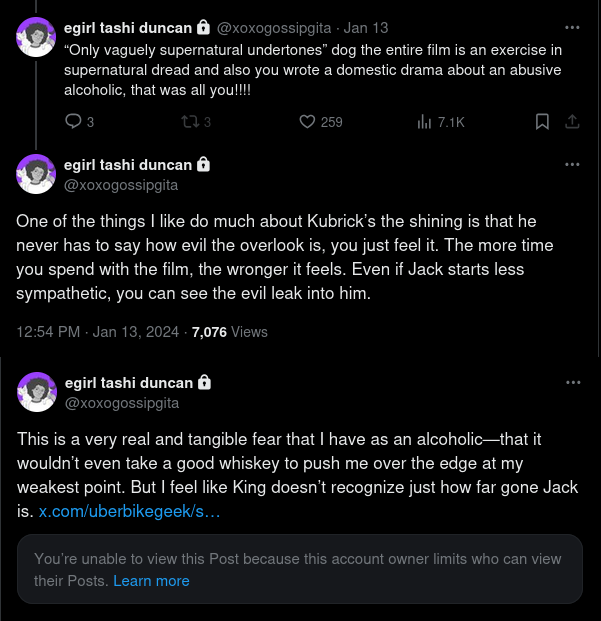
In Eraserhead, Henry attends a tense and awkward family dinner at his girlfriend Mary’s house where he learns that she is pregnant. She moves in with him in his small, grimy Philadephia apartment and has the child. It’s a bizarre little creature swaddled in bandages that quickly becomes ill after Mary leaves its care to Henry. As the stress of caring for his sickly child grows, Henry is plagued by psycho-sexual visions of other women in his life. Henry ultimately cuts the bandages, killing his child that depended on them as a shell and triggering an apocalypse inside his apartment.
After watching Eraserhead, Mel Brooks was taken by Lynch’s directing style and called the film “an adolescent’s nightmare of responsibility.” Mouthwashing too is a nightmare about responsibility, though far less empathetic to its protagonist. Jimmy throughout the first two thirds of the game is resentful of the consequences of his own actions. His sabotaging of the ship nearly kills the captain Curly, leaving him in a state where he’s fully dependent on the crew for survival. With Curly incapacitated, Jimmy is promoted from navigator to interim captain and has to be the one that has an answer for everything. Caring for Curly puts him in repeated conversations with Anya, who he can’t stand talking to even though it’s his history of verbally and sexually abusing her that causes her to be both deferential and guarded. It’s only once the crew starts dropping off one by one that there’s no one else for Jimmy to blame but himself.
Like Henry, Jimmy is haunted by nightmarish visions: the watchful eye of his best friend dotting the corridors, the corpse of Swansea hunting him down, the invisible specter of the company mascot as a viscious beast. But notably the final nightmare is that of an ultrasound and a rampaging creature that wails like a baby. It’s the ultimate nightmare for Jimmy. He could barely handle caring for his best friend with Anya without lashing out at everyone around him. Now he would be responsible for a child while facing down unemployment and irrefutable evidence of sexually assaulting Anya.
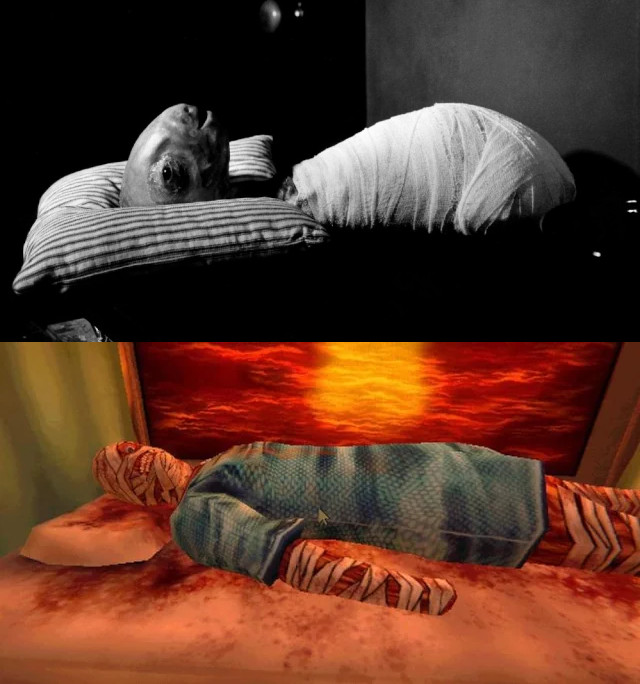
Mouthwashing is a brutally efficient game and I do not think Curly is simply meant to be a stand-in for Anya and Jimmy’s baby. He is fully dependent on Jimmy for survival, but he is much more aware of Jimmy than the baby is of Henry. When Henry cheats on his girlfriend with his neighbor, he looks at his baby not out of fear of getting caught, but out of terror of what his last sexual encounter wrought. The baby has no awareness, no judgement of Henry. Meanwhile, the most distinctive feature Curly has is his single bright blue eye that follows you constantly. It’s the logo of the game. Had Curly been completely wrapped, ignorant of the world around him, he would be a symbolic baby. But this would be too easy for Jimmy. Instead there is a cognizant being silently judging all his actions. And Curly is reduced to a cruel mockery of what he was in life: a bystander. His inaction allowed Anya to be hurt, his refusal to hold his friend to account lead to him crashing out, and now here he is forced to watch Jimmy run amok.
On top of this, Jimmy’s decision to ultimately “save” Curly isn’t the narrative redemptive act you would expect if Curly symbolized a baby and future fatherhood. The cryopod Jimmy places Curly into is a cold shell, a coffin that cements the hell he’s led the whole crew through with his selfish actions. The pod isn’t a magic bacta tank that would rebirth Curly anew. It’s another way for Jimmy to run from the consequences from his actions. He fixated on assigning the roles of “hero” and “villain” while navigating the fallout of his choices with Curly. By giving the pod to Curly, he thinks he’s making a noble sacrifice by forgoing both his own chance at survival and his chance at shape the narrative to his benefit. But the reality is: the crew is dead, Curly’s wounds are so severe that he might not survive the thawing process, and the company is likely to write off a shipment of mouthwash instead of spending the resources to do a search and rescue for 5 employees they just laid off. Jimmy thinks this is what taking responsibility looks like, but choosing not to save himself is not equivalent to atonement. It is an entirely self-soothing act so he can feel like an anti-hero.
The themes of responsibility and reproductive anxiety tie Mouthwashing to Lynchian works like Eraserhead and The Shining, but the way it subtly adds and blends together these horrors with economic anxiety reminds me distinctly of Alien. Alien is best known as being a horror film about forced impregnation, but the looming specter of Weyland-Yutani adds the horror that worker’s lives may be too cheap to care about. Rob Zacny explained the class commentary underlying the Alien movies over at (the now-zombified) Waypoint and how the Alien: Isolation team smartly updated franchise’s economic horror for the modern day. There he writes, “Where the first movie is about and from the perspective of a blue-collar industrial workforce coming to grips with the fact it has been selected for annihilation … Isolation is a product of a time when issues of ownership and interest are less clear, and when it increasingly feels like companies are being bought just so they can be creatively looted.” Yes there are more jobs with less physical precarity, but that risk has been replaced with financial precarity. You never know when “economic headwinds” and “a difficult market” will hit your employer, regardless of industry. And Chapter 11 bankruptcy is so hot right now.

We never get to see how things are outside the ship Tulpar in Mouthwashing, but the few details we get about the Pony Express are dire. The giant cargo ship is scheduled to fly for over a year with only 4 crew members and an intern. The chief medical officer on board is not a doctor, but someone who has a company-sponsored certification. The crew is only afforded one birthday party per trip and access to sugar to make a cake is locked behind a code only the captain can see. The developer Q&A has added that Pony Express, despite being one of the last non-automated carriers, is the cheapest, least-reliable shipping option and that hobbies are “for people who can afford them”. When the crew finds out they will be laid off once they complete this run, Jimmy points out that Curly will land a cushy management job and Daisuke has well-off family. Swansea is an older engineer who’s had a somewhat comfortable life but there’s no mention of retirement as an option. Meanwhile Anya has no savings and Jimmy only landed this job thanks to Curly.
The Tulpar in Mouthwashing and the Nostromo in Alien are not sleek starships with chrome surfaces and touchscreen displays. They are bulky, old cargo freighters carrying space truckers who trade years of their lives to eke out a living. And they ultimately trap their crews with monsters who would doom them. Alien is far more explicit about this, with the corporate android Ash deliberately letting the xenomorph into the ship on the company’s orders. Meanwhile the Pony Express mascot Polle silently haunts its crew members, exploiting their financial precarity. Posters with his cheery face recite platitudes while citing all the ways they can be punished by the company handbook. They’re all trapped in these dead-end jobs that separate them from friends and family for months at a time. There’s no looking around for a better gig in the vacuum of space.
Though you see the nightmare from Jimmy’s eyes, Anya is the one who is truly trapped. Living paycheck to paycheck, she works for the Pony Express to try to pay for medical school.
She tries to limit her interactions with Jimmy, but her responsibilities as the medical officer and the lack of locks on sleeping quarters prevent her from being able to fully protect herself from his advances. As the ship’s navigator, Jimmy can only be held to account by the captain who is either unwilling or unable to rein him in. Isolated, pregnant, and afraid, Anya hides the captain’s gun case away from both Curly and Jimmy. She’s the only one who accepts how dangerous Jimmy already is and how much worse he can be with nothing to lose. When it becomes clear that the crew is stuck in a hell of his making with no chance of rescue, she makes the choice to die on her terms – not Jimmy’s.
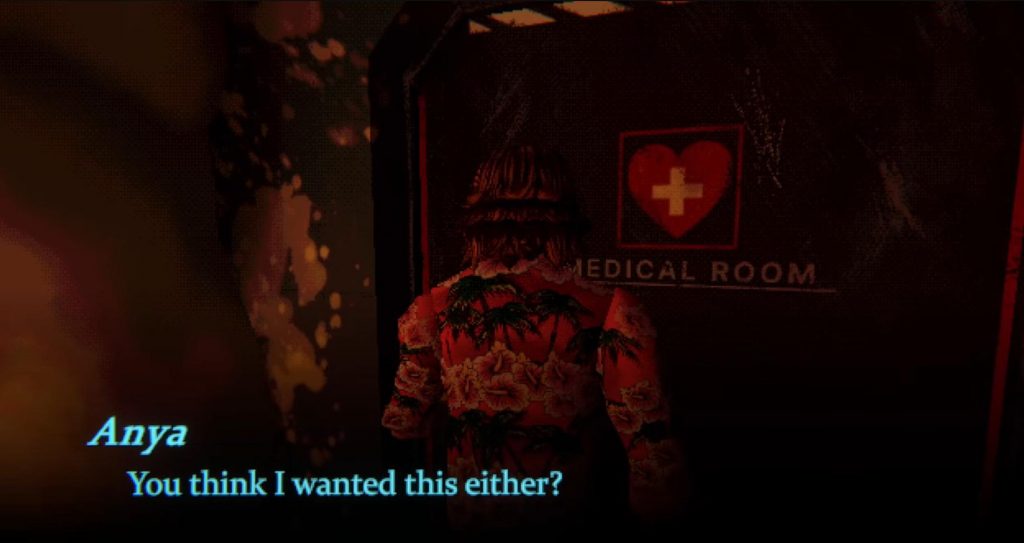
There’s been a lot of fandom discourse over whether Anya should or would have kept her baby, but much like the crew of the Nostromo, that choice is pretty quickly taken out of her hands. Curly refuses to confront Jimmy, uncomfortable with sticking his friend in the brig and losing 25% of his staff in the process. But he also doesn’t give permission for Anya to sleep in the med bay where she could lock her door and feel safe. She finds out she’s pregnant 5 months into a nearly 13 month trip. From what we can tell of the Pony Express’s shoestring budgeting, there’s barely enough stock in the medbay for routine care nonetheless reproductive care. On top of that, a sign warns that any medical expenses incurred on the trip will be docked from the worker’s pay. By the time the Tulpar would finish its run, Anya would be well into her third trimester and immediately unemployed.
What makes Anya’s story so heartbreaking is it’s not just science fiction. Where Alien makes a compelling metaphor about forced pregnancy and corporate negligence, Mouthwashing blends the two in a way that parallels what’s happening now. Though Anya’s story was written by a Swedish team, it’s easy to find stories of real life women in the United States that are living paycheck to paycheck and cannot afford reproductive care or abortion access. Priced out of an abortion, these women have to rely on a network of friends and family to help care for a child they already could not afford, with outcomes being even worse for single mothers and their children. All of this Anya would have to shoulder before even dealing with any legal fallout from reporting her assault on the Tulpar. Had the ship made it to their destination, there would surely be retaliation from Jimmy along with a “thorough investigation” by Pony Express to cover their ass and deny culpability.
Mouthwashing writer Johanna Kasurinen said in an interview with Washington Post’s Gene Park, “I hope certain people in the gaming industry play this game. I hope they see themselves. And I hope it hurts. I hope it hurts, hurts, hurts.” With that quote, Anya’s role as the lone woman feels representative of the ways women in male-dominated fields have to rely on “one of the good men” to advocate for them but are frequently let down. Just last year Activision Blizzard reached a settlement with the California Civil Rights Department for a lawsuit that alleged rampant sexual harassment and discrimination. Examples the department included repeated sexual comments, groping, and promotion of male colleagues who had fewer qualifications but more friends higher up. It’s hard not to see Curly’s failure to protect Anya as a wider symbol of the industry’s unwillingness to protect women in its workforce. Though, as we’ve seen with the increase in layoffs across the industry, the whole operation might just shut down before anyone faces any consequences.
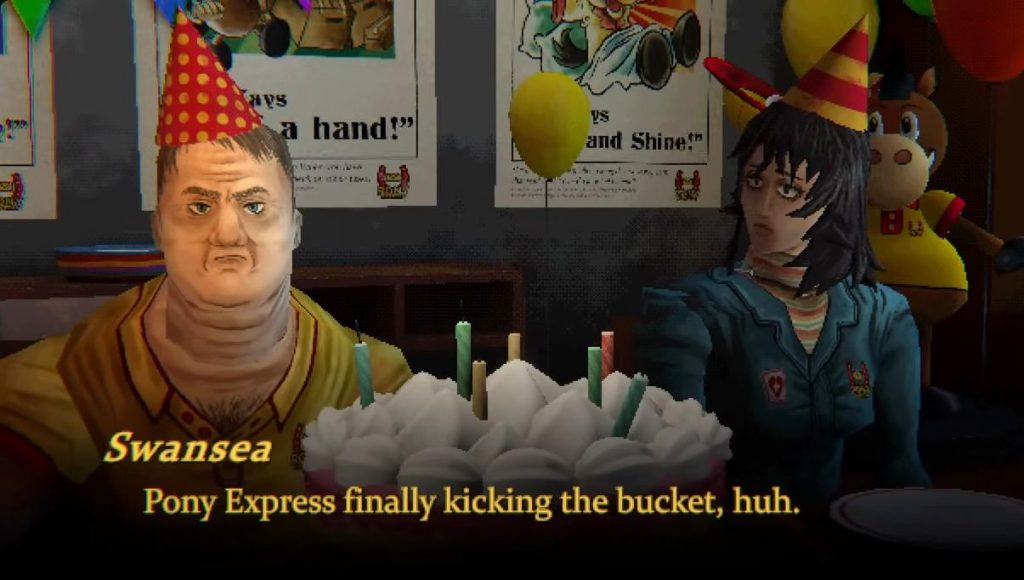
I’ve talked a lot about movies here and when I was 30 minutes in I thought, “wow, this would probably be another A24 banger if it got adapted”. But as I got further in, I realized this really only hits as hard because it is a video game. The visual tricks this game pulls are unique to the medium. Chris Person at Aftermath points out its use of “datamoshing” which produces an artifact-y smear effect on the screen that serves as a transition between each of the game’s scenes. When it first happens, any gamer of a certain age feels a pit in their stomach wondering if their graphics card just died – it’s good at creating a feeling that something is deeply wrong. But as you progress further the effect becomes just a visual abrasion, a signal that you’re about to move to the next chapter, like a dead pixel it’s easily ignored as you and Jimmy adjust to the rapidly deteriorating situation.
The player’s ability to control the camera is also key to how this game plays with perception better than a movie would. Movies have rules about ways you can move the camera, such as the 180° rule, since the audience is relying on the director’s perspective to establish their understanding of space. But with a video game the player is fully in control of the camera, which Mouthwashing quickly exploits in the first five minutes. After exiting the cockpit, you go down a corridor until you hit a locked door. Turning around, you realize the corridor has changed and there’s a new turn to go down. It’s intentionally confusing, but not disorienting. In a movie you might have wondered if you missed something in a previous shot or if footage was cut. But here you had perfect information. Mouthwashing takes turns building your familiarity with the Tulpar’s layout by giving you mundane tasks and then plays with that familiarity by stretching corridors and adding turns as Jimmy’s mental state deteriorates.
And the game does a great job of settling you into what should be a fundamentally unsettling perspective. The adventure game format is pretty straightforward: you are presented with a problem, you have to find the corresponding object and use it to advance the story. But the way this is laid out with the UI complements Jimmy’s juvenile understanding of what responsibility is. To him, responsibility is simply being the one to respond to an endless series of tedious obligations. When you first enter the room where Anya kills herself, the datamoshing effect completely obscures her body. You note it as weird but have to come back later to see what’s there, reflecting how Jimmy either doesn’t care in the moment or never cared at all. Even the gory “Feed Curly” puzzle has meaning in how obtuse it is, taking a couple tries and desensitizing with each attempt. I found myself saying “sorry buddy, maybe this one’s it”, lining up with Jimmy’s perspective of Curly as another problem to be “fixed” and further dehumanizing him. And in the opening of the game, your only choice to exit the cockpit is to set the Tulpar on its doomed path the same way Jimmy saw it as the only way out for himself.
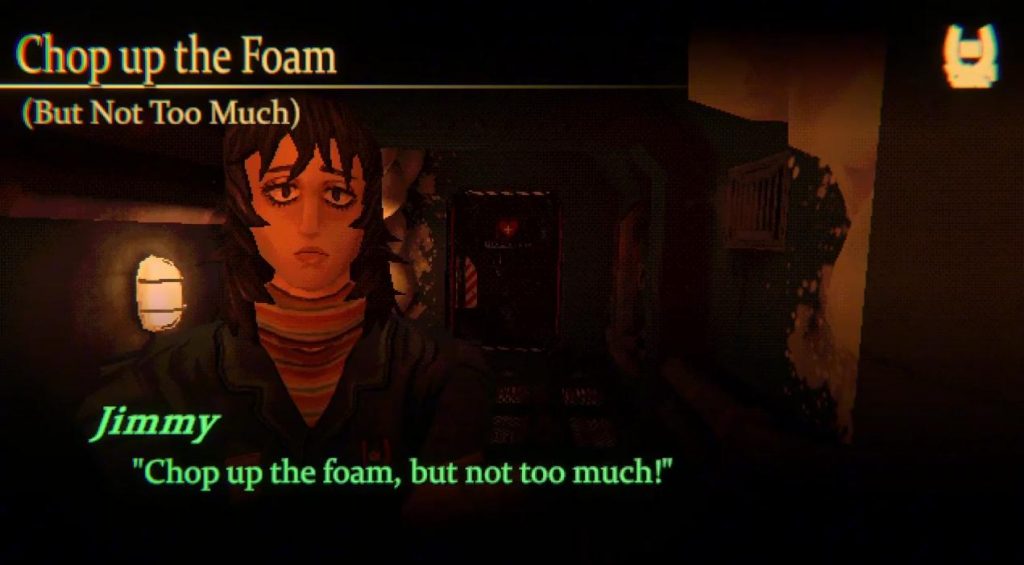
Now the game deftly avoids being one where it tells you to do something bad and immediately scolds you for it. Pretty quickly the blame for the crash is laid at Curly’s feet and a perspective switch to his memories calls into question who exactly you were playing in that opening chapter. Even though in either case the player is the one pressing the button, immediately putting the mystery there allows the player to detach from the first-person perspective and question the narrator. In some ways the player also embodies Curly, unable to change the course of Jimmy’s actions and simply bearing witness to the events that occur. Creating that distance makes it easier to swallow having to play as the shittiest guy in the universe for three hours.
Mouthwashing is a work that makes me understand the phrase “greater than the sum of its parts”. The art direction and soundtrack do a lot of upfront lifting to create an incredible vibe, but it’s not content to rely on pure nostalgia for visuals. I’m a big fan of puzzle games, but the puzzles here vacillate between simple distraction and incredibly obtuse with nothing in the middle. Some of the horror chase sequences, like the graveyard fight, stopped being scary and instead felt like obstacles to seeing more of the story. The story and the character interactions are the easiest part to latch onto here with everyone in the fandom claiming their little scrunglo. But when trying to give others the elevator pitch the story is, to put it mildly, a relatively straightforward workplace drama about being trapped: by responsibility, by sexual violence, by severe injury, by economic hardship, by a literal sealed ship stuck on a rock. It’s the Shining but they replaced the Overlook Hotel with the ship from Alien. And yet it doesn’t feel derivative or like it’s cashing in on lo-fi aesthetics. Those are certainly a draw, but it ends up being an experience that is a unique synthesis of everything that came before it, that must be experienced to be understood, that turns you into a person that writes over 3,000 words about it and mentions it at every party you go to.
If you’ve somehow made it this far without playing the game, first: thank you and second: if you’re still interested, please go play it. I hope it hurts, because the burn means it’s working.
